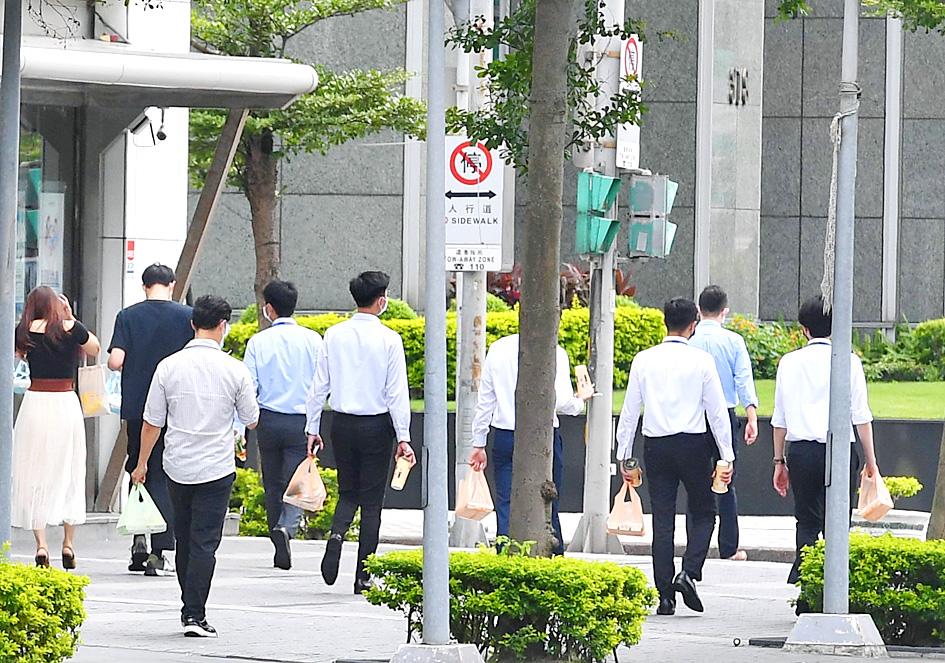More Taiwanese are working from home amid the COVID-19 pandemic, but more than 70 percent of companies want all of their employees back in the office, a 104 Job Bank survey showed.
Seventy-one percent of enterprises preferred all their employees to be in the office, while 29 percent preferred a hybrid work schedule that combined on-site and remote work, the survey showed.
Only 0.3 percent of firms backed remote-work-only arrangements, it showed.

Photo: CNA
Most firms in favor of a hybrid model preferred three days in the office and two days of working from home, the survey showed.
However, 65 percent of office workers preferred a hybrid work schedule, while 30 percent said they wanted to work in the office and only 5 percent wanted to work exclusively from home, it showed.
The online poll, conducted last month and this month, collected 3,419 valid questionnaires from enterprises and 3,390 from job bank members.
The margin of error was 2.5 to 3.5 percentage points for the employer poll and 2.4 to 2.9 percentage points for the employee poll.
Based on the results, a later poll found that 81 percent of employers would not be willing to change work models even if their employees preferred working from home some of the time.
While office workers prefer working from home some of the time, they are willing to adapt to their employers’ requirements that they travel to the office for work, 104 Job Bank head human resources officer Weber Chung (鍾文雄) said.
After Taiwan raised its COVID-19 alert to level 3 on May 19 last year, following a surge in domestically transmitted cases, 58.1 percent of companies introduced work-from-home programs, the job bank said, citing a survey released in June last year.
At the time, 37.7 percent of office workers said they had done some work remotely, the survey showed.
Before Taiwan recorded its first case of the Omicron variant of SARS-CoV-2 last month, about 5 percent of firms and office workers were still operating remotely, the job bank said.
Should domestic cases continue to rise, that rate is likely to increase, it said.
The surveys reflected different perceptions of how effective employees were when working from home.
Businesses said that working remotely led to a net 46 percentage point loss in efficiency and 41 percentage point loss in productivity, while employees felt their efficiency and productivity at home fell by only about 3 percentage points, Chung said.
In a follow-up poll, 49 percent of companies disagreed with the results of the employees’ assessment, Chung said.
However, the employers and employees surveyed did agree that work-from-home programs have three major advantages — improving employee satisfaction, attracting talent and saving on office space leases, Chung said.

The Ministry of Education (MOE) is to launch a new program to encourage international students to stay in Taiwan and explore job opportunities here after graduation, Deputy Minister of Education Yeh Ping-cheng (葉丙成) said on Friday. The government would provide full scholarships for international students to further their studies for two years in Taiwan, so those who want to pursue a master’s degree can consider applying for the program, he said. The fields included are science, technology, engineering, mathematics, semiconductors and finance, Yeh added. The program, called “Intense 2+2,” would also assist international students who completed the two years of further studies in

Former president Tsai Ing-wen (蔡英文) departed for Europe on Friday night, with planned stops in Lithuania and Denmark. Tsai arrived at Taiwan Taoyuan International Airport on Friday night, but did not speak to reporters before departing. Tsai wrote on social media later that the purpose of the trip was to reaffirm the commitment of Taiwanese to working with democratic allies to promote regional security and stability, upholding freedom and democracy, and defending their homeland. She also expressed hope that through joint efforts, Taiwan and Europe would continue to be partners building up economic resilience on the global stage. The former president was to first

Taiwan will now have four additional national holidays after the Legislative Yuan passed an amendment today, which also made Labor Day a national holiday for all sectors. The Chinese Nationalist Party (KMT) and Taiwan People’s Party (TPP) used their majority in the Legislative Yuan to pass the amendment to the Act on Implementing Memorial Days and State Holidays (紀念日及節日實施辦法), which the parties jointly proposed, in its third and final reading today. The legislature passed the bill to amend the act, which is currently enforced administratively, raising it to the legal level. The new legislation recognizes Confucius’ birthday on Sept. 28, the

MORE NEEDED: Recall drives against legislators in Miaoli’s two districts and Hsinchu’s second district were still a few thousand signatures short of the second-stage threshold Campaigners aiming to recall Chinese Nationalist Party (KMT) legislators yesterday said they expect success in 30 out of 35 districts where drives have passed the second-stage threshold, which would mark a record number of recall votes held at once. Hsinchu County recall campaigners yesterday announced that they reached the second-stage threshold in the recall effort against Legislator Lin Szu-ming (林思銘). A total of 26,414 signatures have been gathered over the past two months, surpassing the 10 percent threshold of 23,287 in Hsinchu County’s second electoral district, chief campaigner Hsieh Ting-ting (謝婷婷) said. “Our target is to gather an additional 1,500 signatures to reach